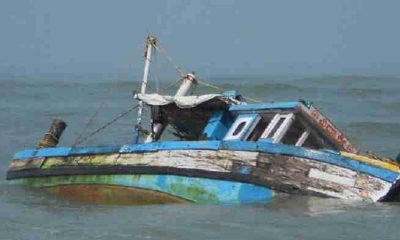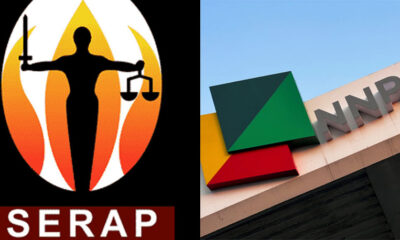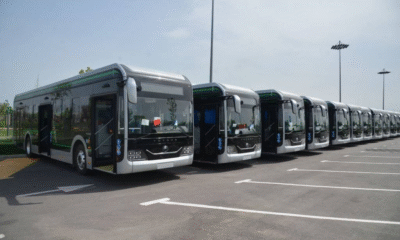News
FEC approves N1.9trn to NNPCL to construct 44 roads under tax credit policy

The Federal Executive Council (FEC), presided over by Vice President Yemi Osinbajo, yesterday, approved the proposal for the Nigerian National Petroleum Corporation Limited (NNPCL) to invest N1.9 trillion in the reconstruction of 44 federal roads under the tax credit policy.
Of this amount, N215.3 billion would be spent on South South and South East roads.
Senior Special Assistant to the President on Media and Publicity Office of the Vice President, Laolu Akande,, who briefed journalists after the meeting said FEC approved the recommendation to invest in the reconstruction of selected federal roads under the Federal Government Road Infrastructure Development and Refurbishment Investment Tax Credit Policy Phase 2 by the NNPCL and its subsidiaries.
He said: “So, the council approved the proposal by the Ministry of Works and Housing for the reconstruction of 44 proposed federal roads with a total length of 4,554 kilometers in the total sum of N1.9trillion.”
The approval is coming 15 months after the NNPCL expressed interest in investing in the reconstruction of selected federal roads in order to sustain a smooth supply and distribution of petroleum products across the country.
President Buhari had on January 25, 2019, signed the Executive Order 007 which was the instrument that brought about the Road Infrastructure Development and Refurbishment Investment Tax Credit Scheme, with the aim to unlocking funding from the private sector to critical road infrastructure in the country.
READ ALSO:
- Reject Tinubu/Shettima if they underperform after 4 years - Remi Tinubu
- US-based Nigerian professor found dead with woman in apparent murder-suicide
- IGP Baba tenure extended, not retiring now – Police minister
The Executive Order 007 was designed to empower private companies to finance construction or refurbishment of federal roads designated as “Eligible Roads” under the scheme and recoup their investments through deduction of the approved total costs expended on the project from their annual Companies Income Tax.
The Road Infrastructure Scheme is a Public-Private Partnership intervention that enables the Federal Government to leverage private sector capital and efficiency for the construction and refurbishment of critical road infrastructure in key economic areas in Nigeria
Under the initiative, the private participants of the scheme provide the funds for the construction or refurbishment projects and in exchange, the participants are entitled to recoup the funds provided as a credit against the Companies Income Tax they are expected to repay. Under the initial programme, the NNPC is currently constructing a total of 1,804.6 kilometres of roads at a total cost of N621,237,143,897.35
A breakdown of the project funding showed that the North-Central geo-political zone, made up of Federal Capital Territory, Benue, Kogi, Kwara, Nasarawa, Niger, and Plateau States, got. the highest chunk of N244.87bn for the construction of 791.1 kilometres of road
The South-South geo-political zone, comprising Akwa-Ibom, Bayelsa, Cross-River, Delta, Edo, and Rivers state, emerged the second highest beneficiary of the NNPCL Road Infrastructure Development and Refurbishment project with N172.02bn for a total of 81.9 kilometres of road.
he South West, made up of Ekiti, Lagos, Osun, Ondo, Ogun, and Oyo States, followed with a total allocation of N81.87bn for the construction of 252.7 kilometres of roads.
The NNPCL allocated N56.12bn to the North-East, comprising Adamawa, Bauchi, Borno, Gombe, Taraba, and Yobe states,the construction of 273.35 kilometres of roads under the scheme.
The South East geo-political zone; the zone is made up of five states, comprising Abia, Anambra, Ebonyi, Enugu,and Imo.states, got N43.28bn allocation for the construction/rehabilitation of 122 kilometres of road.
The NNPC allocated N23.05 billion for the rehabilitation of 283.5 kilometres of road to North West geo-political zone, made up of Kaduna, Katsina, Kano, Kebbi, Sokoto, Jigawa, and Zamfara States. The road projects are being funded by NNPC and the equivalent amount is deducted by the Federal Inland Revenue Service from the National Oil Company’s tax obligations.
Minister of Environment, Mohammed Abdullahi said Council approved the procurement of 31 project vehicles for the hydrocarbon pollution remediation projects in Ogoni land.
He recalled that in December 2022, FEC had approved some projects for Ogoni and remediation of some polluted site.
“In view of the fact that we are going to inspect on a regular basis, experts from outside the country, there’s a need to provide project vehicles so that they can effectively inspect, supervise and monitor the remediation exercise. FEC today approved the sum of N1,354,016,250 in favor of Messers Mujav automobile Nigeria limited to provide 31 number of vehicles for the project. These include one 18-seater Toyota Hiece bus, one 30-seater Toyota coaster bus, they’re all supposed to be 2022 models. Then 11 Toyota Hilux double cabin four will drive also to 2022 model, diesel engine. Then 15 numbers Toyota Hilux double cabin four wheel drives, diesel and petrol engine also 2022 models. Then one Toyota Landcruiser twin turbo 2022 model and lastly two unit of Land Cruiser V6 Prada for the projects. Only 31 vehicles were approved for the hydrocarbon pollution remediation project to ensure effective supervision of the project particularly delimitation sites.“
Sun
News
Ramadan Begins in Nigeria as Sultan Confirms Crescent Sighting
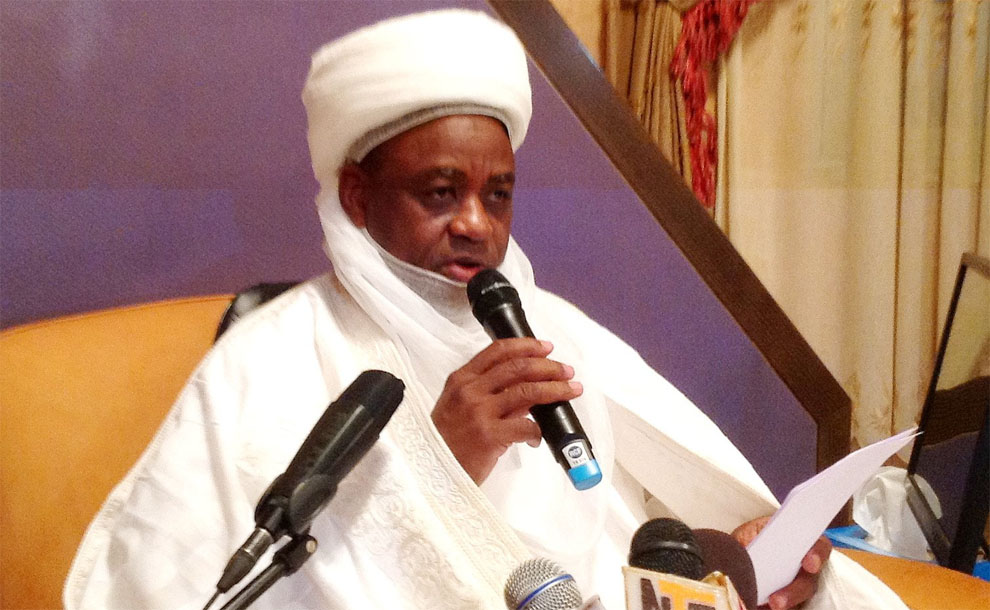
Ramadan Begins in Nigeria as Sultan Confirms Crescent Sighting
Abuja — The Sultanate Council on Tuesday night confirmed the sighting of the crescent moon, officially signaling the commencement of Ramadan 1447AH in Nigeria.
The President-General of the Nigerian Supreme Council for Islamic Affairs (NSCIA) and Sultan of Sokoto, Muhammad Sa’ad Abubakar III, announced that the new moon was sighted in parts of the country, thereby declaring Wednesday, February 18, 2026, as the first day of fasting for Muslims nationwide.
The announcement followed verified reports from moon-sighting committees across several states, in line with Islamic tradition which requires physical sighting of the crescent to mark the beginning of the ninth month of the Islamic lunar calendar.
In his message to the Muslim faithful, the Sultan urged Nigerians to use the holy month to pray for peace, unity, and national development. He also called on Muslims to embody the virtues of patience, compassion, charity, and self-discipline which Ramadan represents.
READ ALSO:
- Deadlock at National Assembly as House Snubs Electoral Act Bill Meeting on E-Transmission Clause
- Maikori Accuses Ex‑Governor El‑Rufai of Persecution Over 2017 Tweet
- Shari’ah Council Defends Kwankwaso, Rejects US “Christian Genocide” Claims
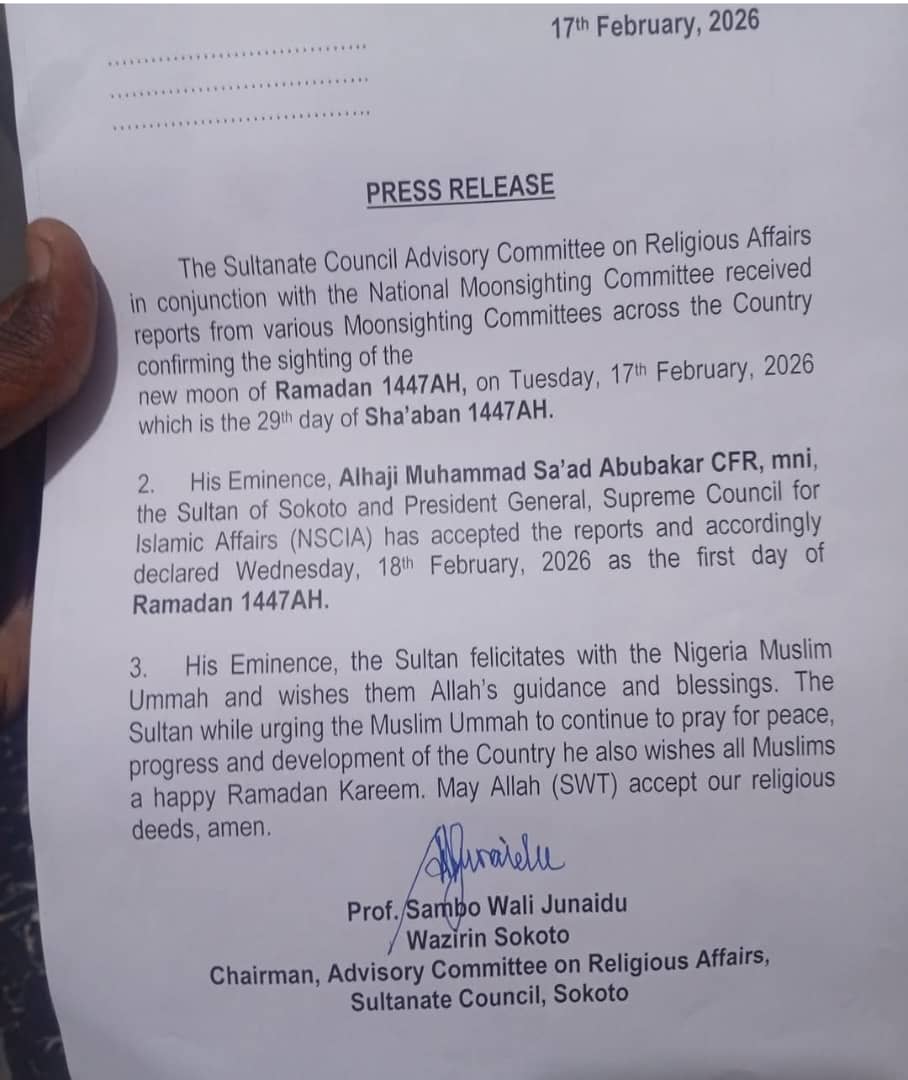 Ramadan, one of the five pillars of Islam, requires adult Muslims to abstain from food, drink, and other physical needs from dawn until sunset throughout the month. The period is also marked by increased devotion, nightly congregational prayers in mosques, recitation of the Qur’an, and acts of charity to the less privileged.
Ramadan, one of the five pillars of Islam, requires adult Muslims to abstain from food, drink, and other physical needs from dawn until sunset throughout the month. The period is also marked by increased devotion, nightly congregational prayers in mosques, recitation of the Qur’an, and acts of charity to the less privileged.
Across major cities including Abuja, Lagos, Kano, and Port Harcourt, mosques recorded increased attendance for special night prayers following the announcement. Markets also witnessed heightened activity as families made last-minute purchases in preparation for the fasting period.
Ramadan will last 29 or 30 days, depending on the sighting of the next crescent, and will culminate in the celebration of Eid al-Fitr, marking the end of the fasting month.
Muslim leaders have encouraged faithful to observe the fast in accordance with Islamic teachings while maintaining harmony and mutual respect within Nigeria’s diverse society.
Ramadan Begins in Nigeria as Sultan Confirms Crescent Sighting
News
Saudi Arabia Confirms Sighting of Ramadan Crescent, Fasting Begins Wednesday

Saudi Arabia Confirms Sighting of Ramadan Crescent, Fasting Begins Wednesday
Riyadh, February 17, 2026 — Authorities in Saudi Arabia have officially confirmed the sighting of the crescent moon marking the beginning of the holy month of Ramadan, signaling that fasting will commence on Wednesday, February 18, 2026.
The announcement was made Tuesday evening following reports from moon-sighting committees across the Kingdom. In a statement carried by state media, the Supreme Court confirmed that verified testimonies of the crescent’s sighting had been received after sunset on the 29th day of Sha’ban.
With the confirmation, Muslims throughout the Kingdom will begin the first fast of Ramadan at dawn on Wednesday.
READ ALSO:
- Deadlock at National Assembly as House Snubs Electoral Act Bill Meeting on E-Transmission Clause
- Maikori Accuses Ex‑Governor El‑Rufai of Persecution Over 2017 Tweet
- Shari’ah Council Defends Kwankwaso, Rejects US “Christian Genocide” Claims
Religious authorities had earlier called on citizens and residents to look for the crescent on Tuesday evening and report any confirmed sightings to the nearest court. Observations were conducted in various regions, including areas around Riyadh and Mecca, as part of the Kingdom’s longstanding tradition of physical moon sighting.
Ramadan, the ninth month of the Islamic lunar calendar, is observed by Muslims worldwide as a period of fasting, prayer, charity, and spiritual reflection. The start of the month is determined by the sighting of the new crescent moon, in accordance with Islamic tradition.
Several other countries in the Gulf region are also expected to begin fasting on Wednesday following similar confirmations, while some nations may rely on local moon sightings to determine their own start date.
Further announcements regarding the duration of nightly Taraweeh prayers and official Ramadan working hours are expected from relevant authorities in the coming days.
Saudi Arabia Confirms Sighting of Ramadan Crescent, Fasting Begins Wednesday
News
Former INEC REC Warns of “Chaos” in 2027 Over E-Transmission of Election Results
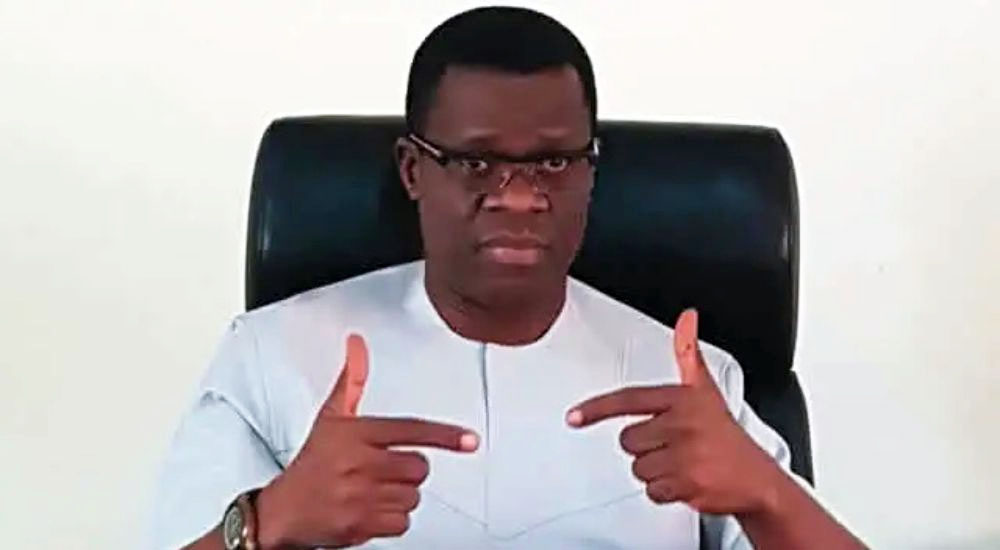
Former INEC REC Warns of “Chaos” in 2027 Over E-Transmission of Election Results
A former Resident Electoral Commissioner (REC) of the Independent National Electoral Commission (INEC), Mike Igini, has raised concerns that Nigeria’s ongoing debate over electronic transmission of election results exposes unresolved legal, institutional, and technological challenges, despite years of electoral reforms. Speaking on Channels Television’s Politics Today on Monday, Igini warned that recent Senate amendments to the Electoral Act could create confusion and vulnerabilities in future elections, particularly the 2027 general polls. He stressed that failing to clarify rules on electronic results transmission risks undermining democracy, transparency, and public confidence.
The controversy stems from the Senate’s recent amendment to the Electoral Act, which now allows electronic transmission of results but removed the “real-time” requirement that had previously been proposed to enable direct uploading from polling units to the INEC Result Viewing Portal (IREV). Under the amendment, Form EC8A, the physical result sheet, remains the primary document in cases of internet outages or connectivity failure. Igini cautioned that this creates a grey area that could trigger disputes in 2027 if presiding officers are allowed discretion over network availability, highlighting that legal and technological clarity is essential to avoid chaos.
READ ALSO:
- DHQ Confirms 100 US Military Personnel Arrive in Bauchi for Counter-Terrorism Training
- Dokpesi Jr, Ex-GMD Akiotu Clash Over DAAR Communications Mgt Restructuring
- EFCC Holds El-Rufai Overnight Over ₦423bn Kaduna Corruption Allegations
Referencing a 2021 technical report by INEC and the Nigerian Communications Commission (NCC), Igini said Nigeria possesses adequate telecommunications coverage, with 2G and 3G networks covering about 93% of the country, making electronic transmission feasible nationwide. INEC had also mapped polling units to mobile network operators and prepared SIM cards and data arrangements to ensure smooth uploads to IREV. He explained that Nigeria had previously relied on interim innovations, including biometric voter registers, card readers, and digital result-viewing platforms, to enhance transparency where legal provisions prohibited full electronic transmission.
Igini further warned that introducing discretionary fallbacks for “network issues” could reintroduce vulnerabilities, as presiding officers might abuse their authority to manipulate results. He emphasised that modern election devices, such as BIVAS machines, can operate both online and offline, uploading results at the nearest connectivity point to ensure integrity in IREV. “The whole purpose of IREV is to make results verifiable and immutable once entered. Allowing manual override defeats the reforms we have painstakingly implemented over the years,” he said.
He also noted that judicial interpretations and evolving legislative amendments have contributed to uncertainty over the legality of technological innovations in elections. Igini urged lawmakers to consider the long-term implications of changes to the Electoral Act, stressing that Nigeria’s democratic stability relies on cooperation between INEC, the judiciary, and key stakeholders. “Our democracy’s future depends on the rule of law. Without it, society risks being dominated by those who act for personal interest rather than public good,” he added.
With the 2027 elections approaching, Igini’s warnings underscore the need for clear legal frameworks, technological preparedness, and robust institutional coordination. He urged all stakeholders to work collaboratively to ensure that electronic transmission of results enhances transparency, accountability, and credibility in Nigeria’s electoral process.
Former INEC REC Warns of “Chaos” in 2027 Over E-Transmission of Election Results
-

 Education3 days ago
Education3 days agoCheck Your Name: UNILORIN Releases Updated NELFUND Refund List for 2024/2025 Students
-

 News2 days ago
News2 days agoOsogbo Sons and Daughters Mark 5th Anniversary with Awards, Political Undertones
-

 News14 hours ago
News14 hours agoSaudi Arabia Confirms Sighting of Ramadan Crescent, Fasting Begins Wednesday
-

 metro2 days ago
metro2 days agoUS Freezes Assets of Eight Nigerians Over Boko Haram, ISIL, Cybercrime Links
-

 News3 days ago
News3 days agoAfenifere Calls for Immediate Take-Off of State Police as Terror Threats Rise in Yorubaland
-

 metro3 days ago
metro3 days agoArgungu Festival 2026 Highlights Peace, Stability, Economic Growth — Tinubu
-

 metro2 days ago
metro2 days agoTerror in Lagos Traffic: Cutlass Gang Unleashes Mayhem on Mile 12–Ketu Road
-

 Entertainment2 days ago
Entertainment2 days agoMystery in Lekki: Police Probe Death of Two Nollywood Crew Found Lifeless in Parked Car



